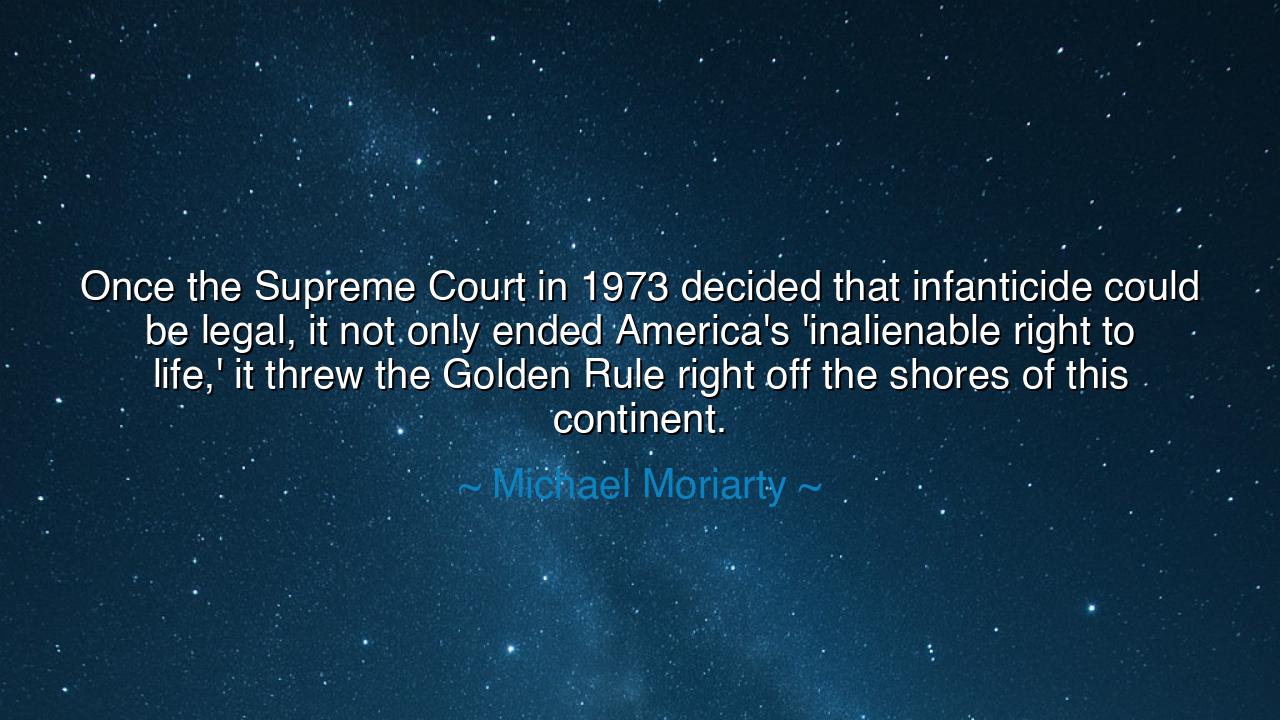
Once the Supreme Court in 1973 decided that infanticide could be
Once the Supreme Court in 1973 decided that infanticide could be legal, it not only ended America's 'inalienable right to life,' it threw the Golden Rule right off the shores of this continent.






In the chronicles of moral reflection and civic law, few moments strike as deeply at the conscience of a nation as the tension between liberty and the sanctity of life. Michael Moriarty’s words, “Once the Supreme Court in 1973 decided that infanticide could be legal, it not only ended America's 'inalienable right to life,' it threw the Golden Rule right off the shores of this continent,” echo a profound concern: the moral and philosophical consequences of legal decisions that redefine the boundaries of human life and ethical responsibility. Here lies a meditation on justice, morality, and the enduring responsibility of law to reflect the values of a civilization.
From the councils of Athens to the forums of Rome, philosophers and legislators grappled with the question of when life begins and what protections it is owed. The ancients recognized that the most vulnerable—the young, the helpless, and the innocent—deserve the highest safeguarding, for the integrity of society depends upon the respect it shows to its most defenseless members. Moriarty’s reflection situates this principle in the modern era, asserting that legal sanction over life itself has profound implications for the moral foundation of a nation.
History provides vivid illustration. In medieval Europe, laws against infanticide emerged in recognition of the value of the unborn and newborn, reflecting both religious and civic imperatives to protect life. Societies that tolerated the killing of the most vulnerable risked moral decay, instability, and the erosion of communal trust. Moriarty draws a parallel to 1973, when the Supreme Court’s decision in Roe v. Wade redefined the legal landscape of life and reproductive choice in the United States. For him, this decision symbolized not merely a legal change, but a profound moral shift with societal repercussions.
Consider the ethical and social implications of such a ruling. For citizens, the extension of legality over acts previously considered morally impermissible can unsettle foundational beliefs about human dignity and rights. Moriarty evokes the imagery of the Golden Rule—the moral principle to treat others as one wishes to be treated—being cast away, suggesting that legal permission can unsettle not only laws but the ethical compass of the nation. This highlights the inseparable connection between legislation and the moral fabric that guides human conduct.
The philosophical resonance of Moriarty’s words is profound: law is not merely a codification of rules but a reflection of societal values. When law permits acts that contravene the most fundamental precepts of empathy, respect, and care for the vulnerable, it challenges the moral underpinnings of the culture it governs. Just as the ancients debated the ethics of life and death in both public and private spheres, modern societies must grapple with the implications of judicial authority and the limits of legality.
For citizens and leaders alike, the lesson is clear. Engage critically with legal and moral decisions, understand their implications for human dignity, and participate in dialogue about the ethical foundations of law. Recognize that rulings are not isolated technicalities but carry consequences that ripple through generations, shaping the values, behavior, and conscience of the people.
Practically, this teaching calls for vigilance, reflection, and action. Educate oneself on the moral and legal dimensions of legislation, advocate for policies that protect the vulnerable, and cultivate societal respect for life and ethical responsibility. Civic engagement ensures that laws remain aligned not only with technicalities but with the enduring principles that safeguard human dignity.
Thus, Michael Moriarty’s words endure as a timeless admonition: the law’s power over life carries profound moral weight, and legal decisions resonate far beyond courtrooms, shaping the soul of a nation. Let this reflection guide leaders and citizens alike, reminding all that justice and ethics must remain intertwined, and that the preservation of life and the Golden Rule are central pillars upon which a society’s integrity and conscience rest.






AAdministratorAdministrator
Welcome, honored guests. Please leave a comment, we will respond soon